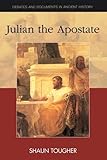Julian the Apostate / Shaun Tougher.
Material type: TextSeries: Debates and Documents in Ancient History : DDAHPublisher: Edinburgh : Edinburgh University Press, [2022]Copyright date: ©2007Description: 1 online resource (224 p.)Content type:
TextSeries: Debates and Documents in Ancient History : DDAHPublisher: Edinburgh : Edinburgh University Press, [2022]Copyright date: ©2007Description: 1 online resource (224 p.)Content type: - 9780748618873
- 9781474473286
- online - DeGruyter
- Issued also in print.
| Item type | Current library | Call number | URL | Status | Notes | Barcode | |
|---|---|---|---|---|---|---|---|
 eBook
eBook
|
Biblioteca "Angelicum" Pont. Univ. S.Tommaso d'Aquino Nuvola online | online - DeGruyter (Browse shelf(Opens below)) | Online access | Not for loan (Accesso limitato) | Accesso per gli utenti autorizzati / Access for authorized users | (dgr)9781474473286 |
Frontmatter -- Contents -- Series Editors' Preface -- Preface -- Acknowledgements -- Abbreviations -- Family Tree -- Maps -- Part I. Debates -- Part II. Documents -- Chronology -- Further Reading -- Essay Questions and Exercise Topics -- Bibliography -- Internet Resources for Julian -- Index
restricted access online access with authorization star
http://purl.org/coar/access_right/c_16ec
This study of the last pagan Roman emperor provides remarkable insight into the man and his timesThe figure of Julian demands the attention of historians. As the last pagan Roman Emperor, he provides a focus for studying the religious transformations that were taking place in the empire in the fourth century. Further, his secular policies and concerns concentrate attention on other transformations - social and political - within the period.Notably, Julian elicited sharply divided opinion from his contemporaries, which is largely polarised between pagan supporters and Christian opponents. Such division of opinion is also matched by the modern literature on him. Was he the prospective saviour of the Roman Empire, or was he out-of-touch and living in the past? Was he an evangelist for Mithraism, or an altogether more traditional pagan? Was he a shrewd military man, or a rash risk-taker whose luck spectacularly ran out on his Persian expedition? These questions and more are asked and discussed, allowing students to reach their own verdict on this exciting and controversial emperor.Key Features:*Issues of historical significance are identified and discussed*Key passages of text are gathered and accessible in one volume*Modern interpretations of Julian are presented and consideredThe figure of Julian demands the attention of historians. As the last pagan Roman Emperor, he provides a focus for studying the religious transformations that were taking place in the empire in the fourth century. Further, his secular policies and concerns concentrate attention on other transformations - social and political - within the period.Notably, Julian elicited sharply divided opinion from his contemporaries, which is largely polarised between pagan supporters and Christian opponents. Such division of opinion is also matched by the modern literature on him. Was he the prospective saviour of the Roman Empire, or was he out-of-touch and living in
Issued also in print.
Mode of access: Internet via World Wide Web.
In English.
Description based on online resource; title from PDF title page (publisher's Web site, viewed 02. Mrz 2022)


